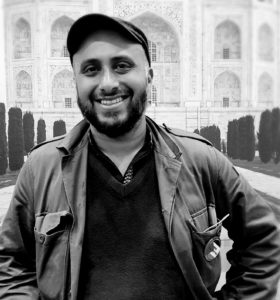Puru Miah is a Labour Councillor in Tower Hamlets, East London. You can follow Puru on Twitter @th_puru.
Trevor Phillips has had a complicated history with the Muslim community. On April 20, things got a lot more complicated with his opinion piece published in the Times entitled, “We need to solve the ethnic puzzle of COVID 19. Could religion explain why some ethnic minorities seem to be more susceptible than others?”
In the article, Phillips claims that due to cultural practices of Muslims, COVID 19 has had a lesser impact. The facts on the ground in Tower Hamlets say otherwise, good old fashion proactive public health engagement with the Muslim community. I know because I was there on the ground, with public health officials, persuading the local Muslim community to voluntarily self-isolate before the government’s own pronouncement and enforced lockdown.
Track record of Islamophobia
This is not the first time Phillips has used cultural tropes against the Muslim community. In March of this year, the All-Party Parliamentary Group on British Muslims (APPG) published a video highlighting Phillips’ Islamophobia.
Subscribe to our newsletter and stay updated on the latest news and updates from around the Muslim world!
He has a form of using tropes which do not match facts on the ground, previously labelling grooming gangs as ‘Muslim sex gangs’, in Rotherham and Rochdale. Both areas are not even highly populated Muslim areas. Moving on from defining Muslims by the grooming narrative, he uses the coronavirus crisis to define them as separate, by using the trope of economic inactivity, segregation of women, and religious ablution.
In his Times article, Phillips starts with some facts then attempts to join the dots through some caricaturing. First, the facts, that 35% of intensive care patients are from an ethnic minority, but make up 14% of the population, but 17% of deaths.
He then goes on to cite that areas with large Muslim communities appear to be less affected than expected, stating ‘”Were poverty the key determinant, we would expect the virus to be running rampant among Britain’s Pakistani and Bangladeshi Muslim communities”.
He then gives the example of Tower Hamlets, in East London, which has more than a third Muslim population, and surrounded by coronavirus hotspots, but appears cocooned from it. He then decodes the exceptionalism in Tower Hamlets through the use of tropes, explaining the “otherness” of the Muslim community: the ritual practice of washing five times a day for prayers, economic inactivity and keeping women at home.
Apart from the ridiculousness of 19th-century Orientalist analysis being applied in 21st century multicultural East London, the analysis does not meet the facts on the ground. The reality of the low number of infections is partly due to a proactive approach by Public Health officials to reach out and explain the health emergency to key stakeholders in the Muslim community and arming them with facts to communicate to their local communities.
Facts on the ground in Tower Hamlets
On Wednesday 18 March, the Tower Hamlets Council of Mosques held a meeting with an infectious disease specialist and an official from Public Health England. I was present assisting the Doctors in their presentation to the Council of Mosques. The meeting was the result of frantic communications in the weekend before, explaining the nature and threat of the coronavirus epidemic, by myself and health professionals.
This proactive engagement yielded results, with the Council of Mosques at the meeting agreeing with doctors recommendation of closing mosques to public congregational prayers. This decision along with the presentation was immediately communicated by the mosques to stakeholders and congregation members.
Two days before the government’s announcement of the lockdown and five days before the imposition of the lockdown on March 23. The meeting was important, as all the mosques in unison did not hold public prayers on Friday that week, preventing the potential spread of the virus among 50,000 regular attendees of Friday prayers in Tower Hamlets.
Public Health England inquiry
The controversy around Phillips, the Muslim community and COVID-19 continues with his appointment by Public Health England to provide expert support to an inquiry into why increasing numbers of victims of the coronavirus pandemic are from BAME backgrounds.
The inquiry is being held to examine the evidence which shows that black people are dying from the virus at almost twice the rate of their proportion of the population, according to the analysis of NHS England data for the first 12,600 deaths from the virus in English hospitals. While black people account for 3.4% of the population, they make up 6.4% of the deaths so far.
The Muslim Council of Britain (MCB), the umbrella group for leading mosques and other Islamic institutions, said the review into the deaths was urgently needed but have objected to Phillips’s appointment. The MCB in a statement published in the Guardian said it is inappropriate that a man recently suspended from the Labour Party over allegations of Islamophobia, and who has a history of making controversial remarks about Muslims should form part of the team leading the inquiry.
One can only hope that Public Health England relies on facts and the evidence on the ground, applying Ockham’s Razor to draw their conclusion, rather than fanciful tropes advanced by Philips. Looking at the publication, validation and appointment of Phillips, one sad conclusion that can be drawn is that the use of Islamophobic stereotypes is a gift horse that does not stop giving, especially to a comfortably numb mainstream media and Whitehall public policy audience.
Hello? Hello? Hello?
Is there anybody in there?
Just nod if you can hear me
Is there anyone at home?
Pink Floyd – “Comfortably Numb” – The Wall – 23rd June 1980






















